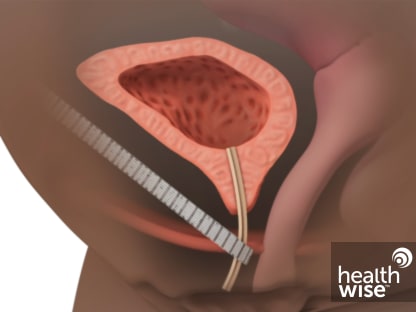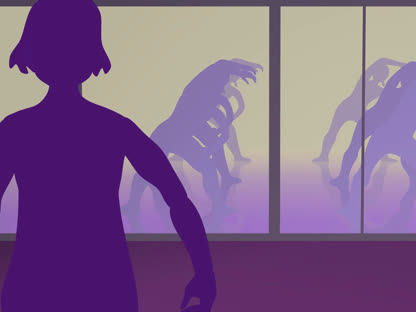Urinary Incontinence
Condition Basics
What is urinary incontinence?
Urinary incontinence is the accidental release of urine. It can happen when you cough, laugh, sneeze, or jog. Or you may have a sudden need to go to the toilet but can't get there in time. These problems are very common, especially among older adults. They usually don't cause major health problems.
What causes it?
Urinary incontinence may be caused by many things. These include conditions that stretch, weaken, or damage the pelvic floor muscles. They can also be caused by problems either in the urinary tract or the nerves that control urination. Other causes include age-related changes, medical conditions such as stroke, and the side effects from medicines.
What are the symptoms?
The main symptom of urinary incontinence is the accidental release of urine. Symptoms depend on the type of incontinence. You may leak urine when you sneeze or cough, or you may always leak urine. Or you may feel a strong urge to urinate, but urine leaks because you can't reach the toilet in time.
How is it diagnosed?
Your doctor will ask about your health history. You'll be asked how often and how much you urinate and leak urine. Your doctor will do a physical exam and check a sample of your urine. And you may need other tests to make sure your incontinence isn't caused by another condition.
How is urinary incontinence treated?
Treatment depends on the type of urinary incontinence you have. It may include bladder training, changes to your diet, medicines, and Kegel exercises to strengthen the muscles that control the flow of urine. Or it may be a combination of these. Surgery is sometimes needed.
Cause
Urinary incontinence may be caused by:
- Weak or damaged pelvic floor muscles.
- Problems or damage either in the urinary tract or in the nerves that control urination.
- A bladder that gets too full. This can happen if your bladder doesn't empty when it should. It can also happen if something is blocking your urethra.
In women, it can be caused by childbirth, weight gain, or other conditions that stretch or weaken the pelvic floor muscles.
In men, incontinence is often related to prostate problems or treatments.
It also may be caused by conditions such as multiple sclerosis, Parkinson's disease, or stroke. Other causes include certain medicines, such as antihistamines and decongestants. Often doctors don't know what causes it.
Prevention
You may reduce your chances for urinary incontinence by:
- Doing pelvic floor (Kegel) exercises, Opens dialog. They strengthen your pelvic muscles, Opens dialog.
- Getting to and staying at a healthy weight.
- Quitting smoking. Smoking causes coughing, which can make it harder to control your urine.
- Limiting caffeine, carbonated drinks, and alcohol.
- Avoiding constipation by eating a healthy, high-fiber, Opens dialog diet.
Learn more
Symptoms
Types of urinary incontinence and their symptoms
There are different types of chronic (long-term) urinary incontinence.
- Stress incontinence means that you leak urine when you sneeze, cough, laugh, jog, lift something, change position, or do something that puts pressure on your bladder.
- Urge incontinence is an urge to urinate that's so strong that you can't make it to the toilet in time. You may feel a sudden urge to urinate and may need to urinate often.
- Mixed incontinence is having symptoms of both stress incontinence and urge incontinence.
- Overflow incontinence means that you have the urge to urinate, but you can release only a small amount. Then later, urine leaks out. Or it can mean that your bladder becomes too full and then leaks urine.
- Functional incontinence means that you can't make it to the toilet in time to urinate. This is usually because something got in your way or you weren't able to walk there on your own.
Learn more
When to Call a Doctor
Call your doctor now if your urinary incontinence does not go away or you also have:
- Weakness or numbness in your buttocks, legs, and feet.
- Fever, chills, and belly or flank pain, Opens dialog.
- Blood in your urine or burning with urination.
- A change in your bowel habits.
Call your doctor if:
- Your incontinence gets worse.
- Leaking urine is enough of a problem that you need to wear a pad to absorb it.
- Incontinence interferes with your life in any way.
- You have incontinence that begins suddenly (acute). Acute incontinence is often caused by urinary tract problems or medicines.
- You have a sudden change in your ability to urinate and you aren't sure if it's related to your urinary incontinence.
Watchful waiting
If you have chronic urinary incontinence that begins slowly, you may be able to control the problem yourself. If home treatment doesn't control your problem, or if incontinence bothers you, ask your doctor about treatment.
Check your symptoms
Exams and Tests
To diagnose urinary incontinence, your doctor will ask about your past health. You'll have a physical exam and be asked about any symptoms. Depending on your symptoms, you may have a pelvic exam. Or if your symptoms could be caused by prostate problems, you may have a rectal exam.
Your doctor will ask about what and how much you drink. You will also be asked how much and how often you urinate and leak urine. It may be easier for you to answer questions if you keep track of these things using a bladder diary for 3 or 4 days before you see your doctor.
You'll also be asked about any medicines you take.
Your doctor will check a sample of your urine. Depending on your results, or if your doctor thinks that your problem may have more than one cause, you may have more tests.
Other tests may include:
- A urine culture. It finds bacteria that can cause urinary tract infections, Opens dialog or prostatitis, Opens dialog.
- A bladder stress test. It simulates the accidental release of urine that may occur when you cough, sneeze, laugh, or exercise.
- A post-void residual volume test. It measures the amount of urine left after you empty your bladder.
- Urodynamic testing. It is a group of tests to check how well the urinary tract stores and releases urine.
Learn more
Treatment Overview
Treatment for urinary incontinence depends on the type you have and how much it affects your life.
Treatments may include:
- Bladder training. This can help you better control when you have to urinate.
- Pelvic floor exercises (Kegels). These help strengthen the muscles that control the flow of urine.
- Medicines. An antidepressant medicine or other medicines may help with bladder control. Estrogen cream used in the vagina may also help.
- Changes in your diet and lifestyle. One example is to limit caffeine, carbonated drinks, and alcohol. These can make you urinate more.
- Medical devices.
- Urinary catheter. This includes condom catheters.
- Penile clamp. This may work for short-term use.
- Incontinence pessary. This fits into the vagina and compresses the urethra.
- Surgery. When other treatments aren't helping enough, you may need surgery. Types of surgery include urethral bulking, surgery to treat an enlarged prostate, and perineal or urethral sling surgery.
Learn more
Watch
Self-Care
If you have urinary incontinence, you can take some steps on your own that may stop or reduce the problem. These include simple changes to your diet and lifestyle.
- Reduce or stop drinking caffeinated and carbonated drinks.
These include coffee, tea, and soda pop.
- Limit alcohol to no more than 1 drink, Opens dialog a day.
- Eat less of any food that might irritate your bladder.
Such foods include citrus fruit, chocolate, tomatoes, vinegars, spicy foods, dairy products, and aspartame. Some people might find this helpful.
- If you smoke, quit.
This may reduce coughing, which may reduce your problem with incontinence.
- Avoid constipation.
- Include fruits, vegetables, beans, and whole grains in your diet each day. These foods are high in fiber.
- Drink plenty of water. Don't avoid drinking fluids because you are worried about leaking urine.
- If you are overweight, try to lose some weight.
Losing even a small amount of weight can help. If you aren't sure how to get started, it can help to talk to your doctor.
- Try pelvic floor (Kegel) exercises, Opens dialog.
They will help to strengthen your pelvic muscles.
- Talk with your doctor about all medicines you take.
This includes prescription and over-the-counter medicines. Find out if any of them may be making your incontinence worse. These may include certain diuretics, sedatives, and even some cold and allergy medicines.
Changing urinary habits to help manage symptoms
If you have urinary incontinence, try one or more of these tips. They may help you gain some control over your symptoms.
- Keep track of your symptoms.
Write down your symptoms and any leaking of urine in a bladder diary. This can help you and your doctor find the best treatment for you. It can also help you find the shortest time you have before you need to urinate again.
- Set a schedule for urinating regularly.
Start with your shortest time, based on your bladder diary. Go whether or not you feel the need. Once you can avoid leaking for a full day, increase your scheduled time by 15 minutes. Do this until you are able to be comfortable urinating every three to four hours.
- Practice "double voiding."
This means urinating as much as you can, relaxing for a few moments, and then urinating again.
- Make it easier to use the toilet in time.
These ideas can be helpful if you have trouble reaching the toilet before you urinate.
- Make a clearer, quicker path to the toilet.
- Wear clothes that are easy to take off (such as those with elastic waistbands or Velcro closures).
- Keep a bedpan or urinal close to your bed or chair.
Learn more
Watch
Related Information
Credits
Current as of: April 30, 2024
Author: Ignite Healthwise, LLC Staff
Clinical Review Board
All Healthwise education is reviewed by a team that includes physicians, nurses, advanced practitioners, registered dieticians, and other healthcare professionals.
Current as of: April 30, 2024
Author: Ignite Healthwise, LLC Staff
Clinical Review Board
All Healthwise education is reviewed by a team that includes physicians, nurses, advanced practitioners, registered dieticians, and other healthcare professionals.










